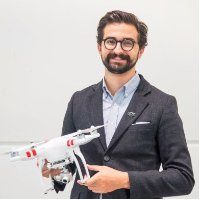The Drone Revolution is upon us. Every day there is a new headline. Every day someone starts a new company. People are flocking to this industry and it is creating a snowball effect of popularity and investments. But as with any rise in technology, there are certain ‘powers that be’ making the whole thing happen. Dronelife spoke to these players to help you put faces to names and get their take on the rise of the drone:


Greg McNeal is an associate professor of law at Pepperdine University and a contributor to Forbes who writes about the ever-evolving status of drone laws and regulations. Most recently, McNeal was the first to discover the inadvertently published FAA documents analyzing the economic impacts of the administration’s proposed drone regulations. This discovery and subsequent media frenzy forced the FAA to officially publish the long awaited Notice for Proposed Rulemaking.
What excites you most about the future of the drone industry?
“The rapid pace of innovation means that we will certainly be surprised by the amazing things that people will do with unmanned aircraft in the future. While the things people are doing now are impressive, in less than 10 years smart autonomy will be common technology . Drones will be true flying robots (rather than remotely piloted aircraft), and so many of the other seemingly impressive things we are doing now will be mundane, and perhaps quaint vestiges of the past.”
What is one piece of advice you would give to first time pilots?
“If you think the thing you’re about to do is impressive because it might be illegal, it’s not impressive.”


Patrick Meier is the man at the intersection of technology and humanitarianism. Meier is always reporting on and initiating the use of UAVs for disaster relief and humanitarian aid on his internationally recognized blog, iRevolutions. His work has been featured in just about every news media outlet you could think of and he has given talks all around the country -from the White House to SXSW. Meier is currently the Director of Social Innovation at Qatar Computing Research Institute.
If you know someone who can’t seem to grasp the importance of drone technology, tell the to follow Meier on Twitter. Should clear the confusion right up
What excites you most about the future of the drone industry?
“The increasingly rapid democratization & accessibility of drones and therefore the incredible innovation that will come from the least expected corners of the world.”
What is one piece of advice you would give to first time pilots?
“My advice to first time drone pilots interested in humanitarian applications is to join the Humanitarian UAV Network and to become familiar with the Code of Conduct. You can absolutely be a part of the solution if you clearly know the do’s and don’ts.”


Michael Perry is the face of DJI, makers of the instantly recognizable Phantom drones. Anywhere and everywhere a drone can fly, whether it’s in places you would expect, like CES, or the last place you would imagine, like the Golden Globes, Perry is sure to be calibrating a Phantom (or an Inspire). He is always anxious to introduce the uninitiated to the wonders of drone technology and get a controller into their hands.
What excites you most about the future of the drone industry?
“There are so many things that are exciting about the way the industry is going. In particular, though, I am most excited about how users will bring their creativity to how drones are used. Every week we see a new application of drones that we never dreamed of. By lowering the barriers to entry – making drones easier to use, more affordable and higher performance – we are going to see a new level of innovation from drone pilots.So I suppose I am most excited about what we don’t currently know about the future of the industry!”
“Take it slow! When your drone arrives the inclination is to tear open the box and start flying immediately. I absolutely recommend taking some time to read the instructions, research local rules, watch the online tutorial videos and choose a location without too many people or obstructions before flying.”
Brendan Schulman is the Saul Goodman of the drone industry. In just about every high-profile legal cases involving a drone pilot and the FAA, Schulman has been the counsel for the pilot. His official title is Special Counsel in the Litigation Department of Kramer Levin Naftalis & Frankel LLP where he heads the firm’s increasingly popular Unmanned Aircraft Systems practice. Whenever industry news breaks or a pilot receives a cease and desist from the FAA, everyone thinks the same thing: Better Call Brendan!
What excites you most about the future of the drone industry?
“I’m mostly excited by the number of lives that will be saved by using this technology in search and rescue, fire response, infrastructure inspection, and many other safety-related applications. It is exciting to see technology that has, for many people, just been a source of recreation and entertainment increasingly become a platform for such useful and innovative activities.”
What is one piece of advice you would give to first time pilots?
“I think it’s critical for first-time drone pilots to gain knowledge and experience with the equipment in a safe location before taking the drone to more challenging environments. I have spent 20 years as a recreational model aircraft (“drone”) enthusiast and there is no replacement for getting to know the equipment, building up your skills, and recognizing your limitations. It’s a little like skateboarding in the 1980’s, you want to take the time to learn before doing tricks, and you want to find places that are not going to be objectionable.”
Jonathan Evans is one of the most enthusiastic people in the industry. And he has good reason to be; his company, Skyward, is well funded and involved in every aspect of the UAV industry. From software management solutions to step-by-step pilot and vehicle certification, if you have a problem with your commercial drone, Evans and his team can help you solve it.
What excites you most about the future of the drone industry?
“I get most excited about seeing ‘The Jetsons’ actually come to fruition in my lifetime. Being a professional helicopter pilot of many years and becoming a full-fledged drone geek more recently, I can see the technological pieces and parts, as well as the infrastructure needed to make this a reality. It won’t be long before we trust the engineering in the autopilots, gyros, and sensors that keep these small aerial robots stabilized in a known, coordinated, and fluid airspace. I see the confluence of these technologies lifting autonomous personal transport machines safely into the air within a decade. Give more time, and we’ll be making jokes about driving cars like we do about listening to 8-tracks!”
What is one piece of advice you would give to first time pilots?
“Embrace your role and responsibility as history’s newest kind of aviator. There is a code and a culture of safety in aviation; a professionalism, stewardship, and respect for the magnificent capabilities of flying machines held in tension against the many things that can go wrong with such complex systems. That profound tension is held in balance by aviators, and I think it’s this sacred responsibility that gives aviation culture its lore. It’s an enormous privilege to be in command of a machine that can take flight, and that privilege comes with enormous responsibility.”
Helen is one of the founders of iRobot, manufacturer of the iconic Roomba. In 2008, she stepped down from her position of Chairman of the Board at iRobot and founded crisis response UAV developer CyPhy Works. Her latest venture is one of the most well-funded drone startups and focuses on tethered drones that can stay airborne much longer than their free-roaming counterparts. Last April, Greiner was named a Presidential Ambassador for Global Entrepreneurship by the President Obama.
What excites you most about the future of the drone industry?
Drones making life better with applications such as home drone delivery, mobile drone delivery (ie you are at beach or park), and wireless everywhere.
What is one piece of advice you would give to first time pilots?
Fly in an open space within line of sight. Have fun!
Mr. George might not be the most recognizable name on this list, but his role in the future of the industry is arguably the most important. As Parrot’s Vice President of Sales & Marketing for the Americas, it is Mr. George’s job to get drones (specifically the AR Drone 2.0 and the Bebop) onto as many store shelves as possible. This angle makes Parrot unique among drone manufacturers who, by and large, conduct sales exclusively online. George is giving drones a presence in people’s lives by physically putting them right where you shop. Among other retail locations, Parrot’s drones can be found at Best Buy, Apple stores, Verizon stores, and (until recently) even Radioshack.
What excites you most about the future of the drone industry?
Drones are not a fad, they are here to stay. We can already do amazing things with Drones however once the FAA confirms its new regulations, especially for commercial use, we are going to see an industry explosion. From news gathering to professional photography, law enforcement, mining and agriculture; the commercial use of Drones is going to create a futuristic industry that most of us can’t yet imagine.
What is one piece of advice you would give to first time pilots?
Take the time to truly understand your Drone. Drone Technology is developing so quickly that new models include advanced features like GPS, HD fish-eye camera’s and autonomous flight. You can do so much more today than you could just 18 months ago.
Alan is serial entrepreneur, active angel investor, and a drone enthusiast. He co-founded DRONELIFE.com to address the emerging commercial market for drones and drone technology. Prior to DRONELIFE.com, Alan co-founded Where.com, ThinkingScreen Media, and Nurse.com. Recently, Alan has co-founded Crowditz.com, a leader in Equity Crowdfunding Data, Analytics, and Insights. Alan can be reached at alan(at)dronelife.com